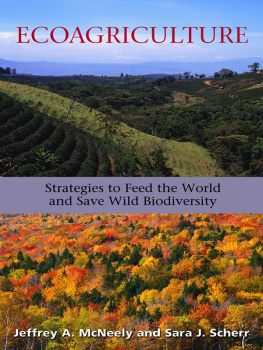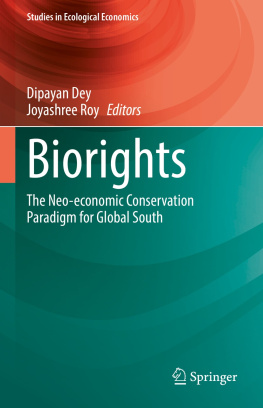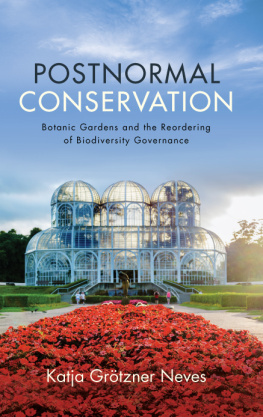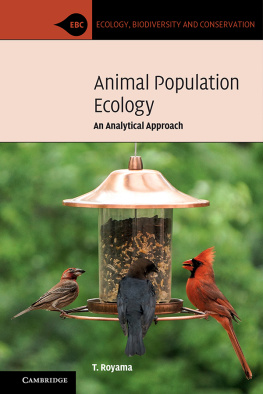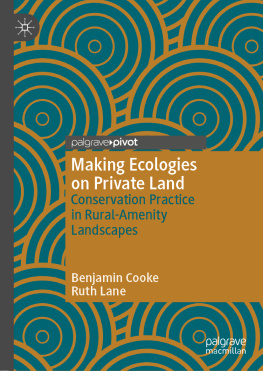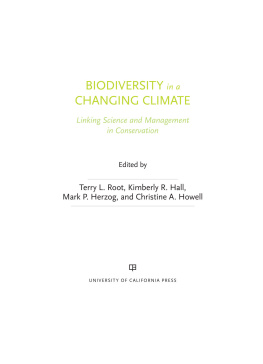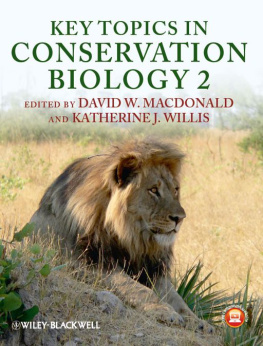Contents
Print Page Numbers

Land Rights, Biodiversity Conservation and Justice
In the context of sustainable development, recent land debates tend to construct two porous camps. On the one side, norms of land justice and their advocates dictate that peoples rights to tenure security are tantamount and even sometimes key to successful conservation practice. On the other hand, biodiversity protection and conservation advocates, supported by global environmental organizations and states, remain committed to conservation strategies, steeped in genetics and biological sciences, working on behalf of a global mandate for biodiversity and climate change mitigation.
Land Rights, Biodiversity Conservation and Justice seeks to illuminate struggles for land and territory in the context of biodiversity conservation. This edited volume explores the particular ideologies, narratives and practices that are mobilized when the agendas of biodiversity conservation practice meet, clash, and blend with the demands for land and access and control of resources from people living in, and in close proximity to, parks.
The book maintains that, while biodiversity conservation is an important goal in a time where climate change is a real threat to human existence, the successful and just future of biodiversity conservation is contingent upon land tenure security for local people. The original research gathered together in this volume will be of considerable interest to researchers of development studies, political ecology, land rights, and conservation.
Sharlene Mollett is an assistant professor in the Centre for Critical Development Studies and the Department of Human Geography Department at the University of Toronto, Canada.
Thembela Kepe is a professor in the Department of Geography, and the Centre for Critical Development Studies at the University of Toronto, Canada.
Routledge Studies in Sustainable Development
This series uniquely brings together original and cutting-edge research on sustainable development. The books in this series tackle difficult and important issues in sustainable development including: values and ethics; sustainability in higher education; climate compatible development; resilience; capitalism and de-growth; sustainable urban development; gender and participation; and well-being.
Drawing on a wide range of disciplines, the series promotes interdisciplinary research for an international readership. The series was recommended in the Guardians suggested reads on development and the environment.
Universities and Global Human Development
Theoretical and Empirical Insights for Social Change
Alejandra Boni and Melanie Walker
Sustainable Development Policy
A European Perspective
Michael von Hauff and Claudia Kuhnke
Creative Practice and Socioeconomic Crisis in the Caribbean
A Path to Sustainable Growth
Kent J. Wessinger
Engineering Education for Sustainable Development
A Capabilities Approach
Mikateko Mathebula
Sustainable Pathways for our Cities and Regions
Planning within Planetary Boundaries
Barbara Norman
Land Rights, Biodiversity Conservation and Justice
Rethinking Parks and People
Edited by Sharlene Mollett and Thembela Kepe
Land Rights, Biodiversity Conservation and Justice
Rethinking Parks and People
Edited by Sharlene Mollett and Thembela Kepe

First published 2018
by Routledge
2 Park Square, Milton Park, Abingdon, Oxon OX14 4RN
and by Routledge
711 Third Avenue, New York, NY 10017
Routledge is an imprint of the Taylor & Francis Group, an informa business
2018 selection and editorial matter, Sharlene Mollett and Thembela Kepe; individual chapters, the contributors
The right of Sharlene Mollett and Thembela Kepe to be identified as the authors of the editorial matter, and of the authors for their individual chapters, has been asserted in accordance with sections 77 and 78 of the Copyright, Designs and Patents Act 1988.
All rights reserved. No part of this book may be reprinted or reproduced or utilized in any form or by any electronic, mechanical, or other means, now known or hereafter invented, including photocopying and recording, or in any information storage or retrieval system, without permission in writing from the publishers.
Trademark notice: Product or corporate names may be trademarks or registered trademarks, and are used only for identification and explanation without intent to infringe.
British Library Cataloguing-in-Publication Data
A catalogue record for this book is available from the British Library
Library of Congress Cataloging-in-Publication Data
A catalog record has been requested for this book
ISBN: 978-1-138-21772-0 (hbk)
ISBN: 978-1-315-43946-4 (ebk)
Typeset in Times New Roman
by Wearset Ltd, Boldon, Tyne and Wear
Brock Bersaglio is a postdoctoral fellow in the Department of Geography at the University of Sheffield and an Affiliated Researcher in the East African Institute at Aga Khan University. Focusing on East and Southern Africa, his work investigates the interplay between biodiversity conservation, rural society, and ideologies of nature.
Khairul Chowdhury is Associate Professor in the Department of Sociology, University of Dhaka, Bangladesh. His work examines indigenous peoples in Bangladesh and their relations to colonial and postcolonial states and ideologies of nations, development, and conservation. His research interests include frontiers, forests, climate change, and social transformation in South Asia, and contemporary social theories and Marxism.
Mara Camila Gonzlez is an independent researcher based in Bogota, Columbia. Her research focuses on political anthropology and is particularly interested in the ways in which rural populations rework complex relations with nature and diverse spaces of the countryside in Colombia.
Shubhra Gururani is Associate Professor of Social Anthropology at York University, Canada. Her current research focuses on the politics of land acquisition, planning, and city-making in peri-urban India, with a focus on the Millennial City, Gurgaon. Her recent work has appeared in Urban Geography and Economic and Political Weekly.
Thembela Kepe is a professor in the Department of Geography and the Centre for Critical Development Studies, University of Toronto. He is also a visiting professor in Geography at Rhodes University, South Africa. He works on land rights, peopleenvironment interactions, and rural livelihoods.
Vanessa Lamb is a lecturer in the School of Geography at the University of Melbourne. Dr. Lamb is a human-environment geographer and political ecologist whose work also includes policy analysis and research into the social dimensions of environmental change.
Elizabeth Lunstrum is an associate professor in the Department of Geography at York University in Toronto, Canada. Her research interests include green militarization, conservation-induced displacement, Indigenous conservation and wildlife management, and the political ecology of international borders. Her work focuses on southern Africa and North America.


